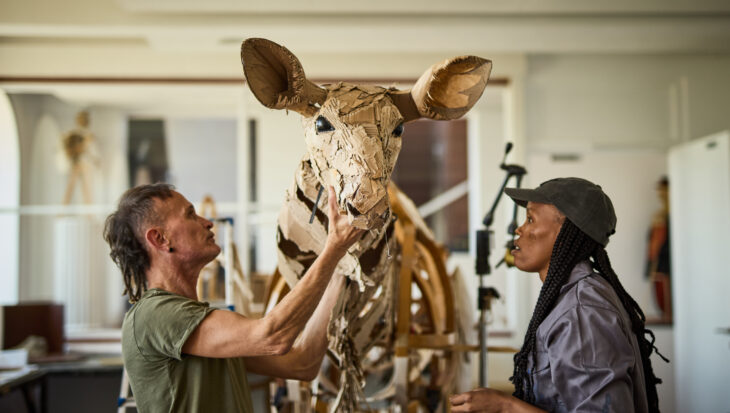‘The Herds’ will be arriving in London this Friday!
Have you heard? A breathtaking arts initiative, ‘The Herds’ will be arriving in London this Friday.
Posted 27 Jun 2025

Posted on the 1st June 2004
On March 31, Portsmouth South MP, Mike Hancock, asked an apparently innocuous parliamentary question of the Home Secretary. 'What recent research', Hancock wanted to know, had his Department 'commissioned and evaluated on the efficacy of animal experiments?'
The answer was unequivocal. ‘The Home Office has not commissioned or evaluated any formal research on the efficacy of animal experiments.’ In the language of tabloid newspapers, this admission was a ‘bombshell’.
Here was the government department in charge of regulating vivisection admitting that it had – neither recently nor at any other time – bothered to assess in a systematic way whether experimenting on animals produced beneficial results for people.
The starkness of the admission was made all the more glaring by the ‘cut and paste’ paragraphs that followed it in the formal written answer to Hancock. ‘Animal experiments must be judged to be potentially efficacious in order to be licensed under the Animals (Scientific Procedures) Act 1986, which requires that animals may only be used in scientific procedures where such use is fully justified, where the likely benefits outweigh the costs to the animals involved, and where the procedures are most likely to produce satisfactory results.’
The startling inconsistency in this answer is hardly difficult to detect – the Home Office will never grant permission for animals to be experimented upon, it was saying, unless it is sure that such experiments produce benefits that outweigh the harm done to the animals. Yet it has never itself bothered to develop a formal test – based on its own research or anyone else’s – by which it can make such a judgement.
But then, when pressed to make a scientific case for using animals in safety tests for new drugs and chemicals, the Department of Health (DoH) is equally deficient. In 2002, a House of Lords Select Committee investigation into the merits of animal experiments was given a dossier by the DoH supposedly proving that such experiments are of immense value in determining whether a given substance is likely to harm people. One of the DoH-approved scientific papers actually listed several problems with animal research data, including the fact that humans live very much longer than all test species and, therefore, toxic substances have more time to express themselves.
Another DoH author noted that ‘… adverse effects of drugs in humans, not easily predicted by animal studies, include nausea, headache, dizziness, tinnitus, vision disturbances and hypersensitivity and skin reactions’ – the very symptoms most commonly experienced as side effects.
A third DoH-approved author noted that, in a review of 114 drugs withdrawn for human use because of their dangerous side effects, only six showed similar effects when tested on animals.
More recently, we have a cool demolition job of animal experiments published in the British Medical Journal by a team of scientists working at Bristol, Edinburgh and Yale universities and at the London School of Hygiene and Tropical Medicine. In analysing numerous previously published scientific papers, they posed the question: ‘Where is the evidence that animal experiments benefit humans?’ They could find none.
Inevitably, their report inspired rancorous rebuttals from the likes of Professor Colin Blakemore of the Medical Research Council. But then it was Blakemore who said on Radio 4’s Today programme that logic played no part in Animal Aid’s successful challenge – much of it rooted in scientific argument – to Cambridge University and its plans to build a vast monkey research centre. Blakemore was allowed to make his statement unchallenged during an item in which my own contribution was heavily edited. My complaint produced an apology from the BBC governors, a rebuke for the Today team and an acknowledgment that Blakemore should not have been allowed to get away with his false assertion.
The conclusion to be drawn from the above seems to me clear. Those at the commanding heights of the vivisection bureaucracy can advance no credible argument to support the practice. They offer only formulaic but ultimately empty ‘justifications’. When those fail there is ill-tempered smear. In other words, the animal experimentation edifice rests not on science but on dogma.
Oh yes, Mike Hancock – as a follow-up – asked the Home Secretary whether he will make it his policy to commission an evaluation of the efficacy of animal experimentation. The answer? ‘The government has no plans to do so.’
No need to wonder why.
Andrew Tyler

This comment by Andrew Tyler is reproduced from the Summer 2004 issue of Outrage – Animal Aid’s quarterly magazine which is sent to all Animal Aid members. To find out more about joining Animal Aid click here.
Have you heard? A breathtaking arts initiative, ‘The Herds’ will be arriving in London this Friday.
Posted 27 Jun 2025

As the greyhound racing industry releases its annual data on the number of dogs’ deaths, a raft of well-known names - alongside their canine friends - has called upon the Government to end greyhound racing....
Posted 26 Jun 2025
